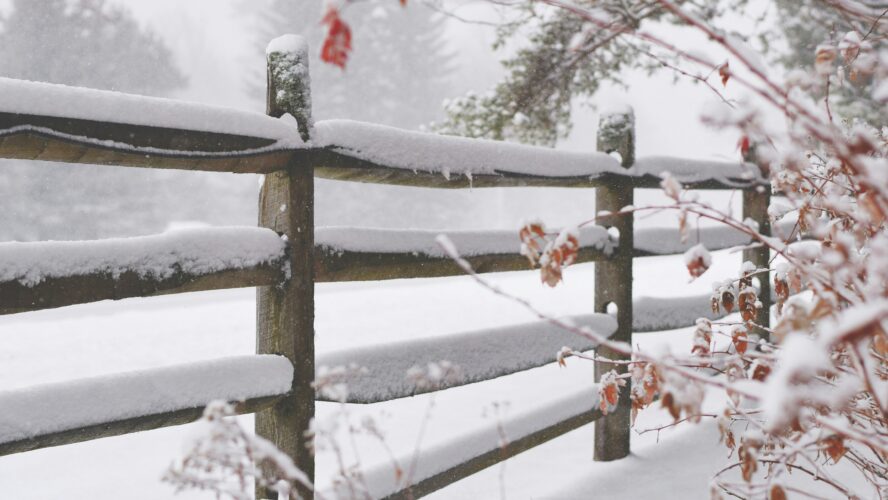6 Timely, Frigid Tips For Winter Composting

“If you like it in winter, you’ll love it in summer,” my real estate agent told me as I was surveying the vast amount of snow covering my soon-to-be back yard. It’s true, if you like your outdoor space in winter, you’ll love it in summer. The same is true for compost bins. Put in the effort of schlepping through snow to maintain it, and in the warmer months you’ll have this valuable garden tool ready to use. Here are six tips for successful winter composting.
1. Variety is the spice of life…and winter composting.
During colder months your compost bin wants both brown and green waste. Brown waste is organic matter such as leaves, twigs, cardboard, and newspaper. Green waste is your kitchen scraps such as egg shells, fruit and vegetable peels, and coffee grounds.
2. Think small for winter composting
Because cold weather reduces the rate of decomposition, make sure that the material you add to your compost bin is small. Chop up kitchen scraps and tear up cardboard before adding.
3. Insulate!
Just like you, your compost wants to live in an insulated house. Heat powers the decomposition process, and insulation keeps that heat trapped in the bin.
You can insulate the sides and top of your compost bin with hay or straw bales.
Another option is making a cardboard and insulation sandwich. To do this, line the sides of your compost bin with a layer of cardboard. Then place a layer of home insulation (the kind you buy at home stores) around the sides, and hold that insulation in place with another layer of cardboard.
Luckily, snow is a great insulator. So, if you live in an area of the country that already has a couple feet of snow you’re in luck. Unfortunately, if you live in an area that has received mostly ice, then you need another method of bin insulation.
4. Winter composting requires dampness
Moisture is an important part of the decomposition process. Again, if you live in a snowy area and get some warmer days throughout the season, the snow may melt and provide your compost bin with adequate moisture. Locating your compost bin in a sunny place may help with this melting.
Thankfully, much of the green waste that you’re adding contains water. If you produce a lot of kitchen scraps, then they may provide enough moisture.
5. Winter composting requires oxygen
Oxygen is another key element of the decomposition process. If your compost bin has small gaps or holes in it, then it is probably receiving enough oxygen.
If your bin is sealed tighter, then you need to aerate. You can do this by using a pitchfork to turn the compost, but that can be a hefty chore even in warmer weather. Another option is to aerate with a large plastic PVC pipe. To do this, you need a PVC pipe that is at least two inches in diameter and is as long as your compost bin is tall. Drill holes all over the PVC pipe and insert it into the center of the compost.
6. Consider the critters
Consider your compost bin from a mouse’s perspective: It’s warm, cozy, and chock full of goodies to eat. Of course, from your perspective, things aren’t quite so great because rodents are a problem for compost all year round and especially in winter.
You can try placing traps around your compost bin, but be very cautious because the only thing worse that hauling compost out to a bin on a freezing cold, dark evening is getting your fingers pinched in a trap.
Moisture may help keep mice away, but if it freezes then it won’t work.
Trying sealing up any small holes in your compost bin to keep critters out, but remember that those holes also provide necessary oxygen. This is why I don’t think wrapping your compost bin in a plastic tarp is a great idea.
If worse comes to worst, and you have no other viable way to keep the critters out of your compost, then consider collecting your green waste (that’s what the mice are after) in a large, tightly sealed plastic container until spring. Store this container outside or in an un-insulated garage and it will freeze until the weather warms. Of course, without this green waste your compost bin may go into hibernation mode and not be very microbially active during the coldest months, but rest assured that you can bring it back to life in the spring.
Related on Organic Authority
3 Easy Steps to Worm Composting Bins That Won’t Gross You Out
3 Surprising Composting Tips for Apartment Dwellers
How To Make Dog Poop Compost That Won’t (Totally) Gross You Out
photo of squirrel in snow via Shutterstock

